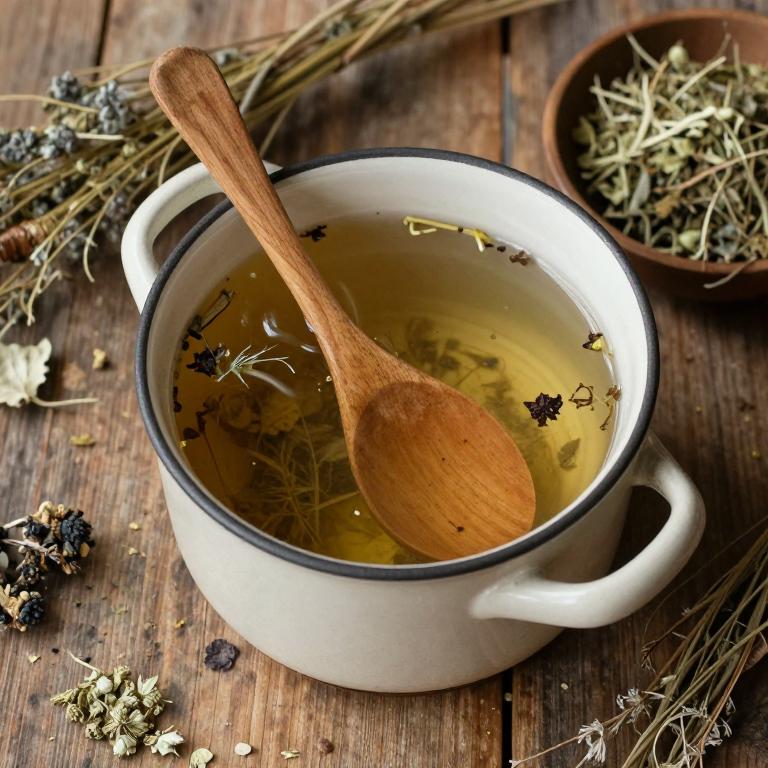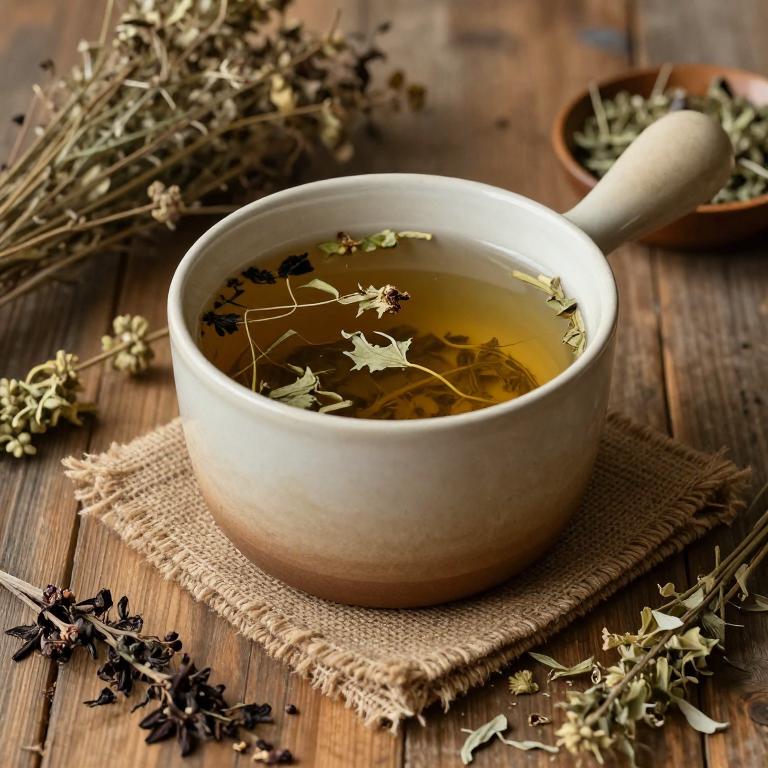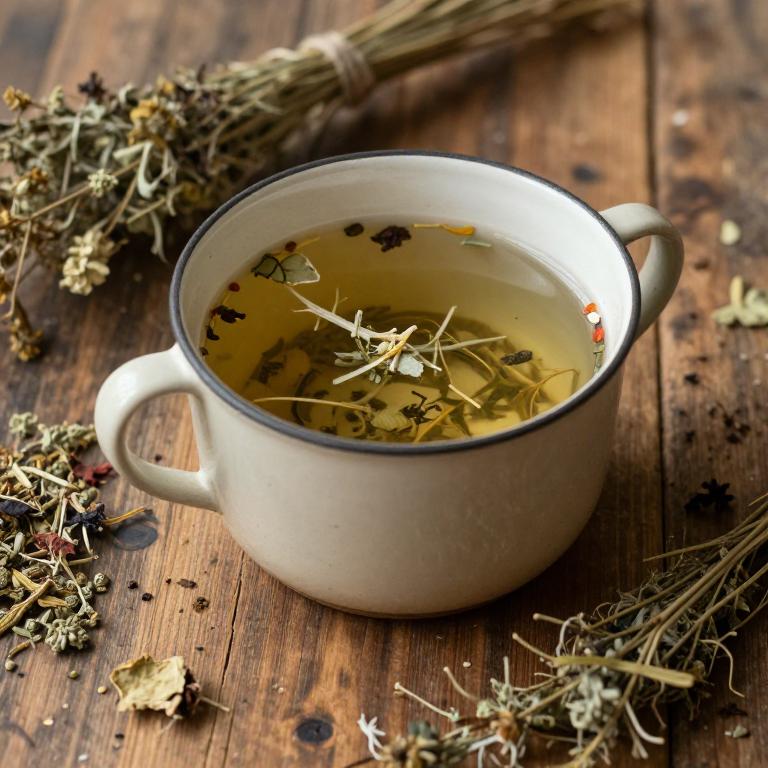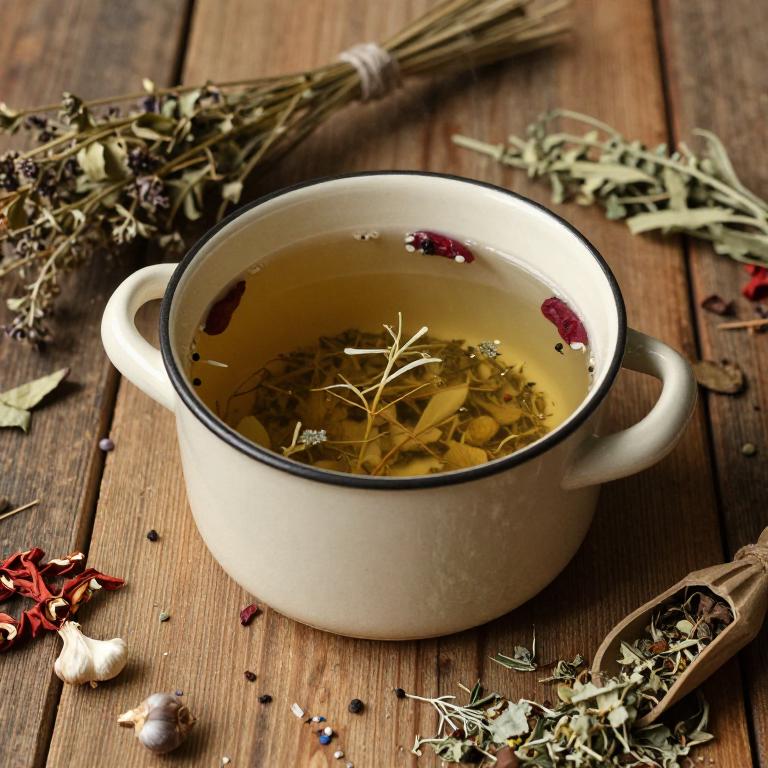10 Best Herbal Decoctions For Eye Twitching

Herbal decoctions have been traditionally used to address various health conditions, including eye twitching, which is often linked to stress, fatigue, or nerve imbalances.
Certain herbs such as valerian root, passionflower, and lemon balm are commonly included in these decoctions due to their calming and nerve-soothing properties. The preparation involves simmering dried herbs in water for an extended period to extract their active compounds, which are believed to promote relaxation and reduce muscle spasms. While some people find relief through regular consumption of these herbal teas, it is important to consult a healthcare professional before using them, especially if symptoms persist or are severe.
Overall, herbal decoctions offer a natural approach to managing eye twitching, though their effectiveness may vary among individuals.
Table of Contents
- 1. Valerian (Valeriana officinalis)
- 2. St. john's wort (Hypericum perforatum)
- 3. Yarrow (Achillea millefolium)
- 4. Stinging nettle (Urtica dioica)
- 5. Ginkgo (Ginkgo biloba)
- 6. Blessed thistle (Cnicus benedictus)
- 7. White water lily (Nymphaea alba)
- 8. Field horsetail (Equisetum arvense)
- 9. Chamomile (Matricaria chamomilla)
- 10. English lavender (Lavandula angustifolia)
1. Valerian (Valeriana officinalis)

Valeriana officinalis, commonly known as valerian, is a traditional herbal remedy often used for its calming and sedative properties.
While primarily recognized for its effects on sleep and anxiety, some herbal practitioners suggest that valerian root decoctions may help alleviate symptoms of eye twitching by reducing nervous system overactivity. The herb contains compounds such as valerenic acid and isol valerenic acid, which are believed to influence neurotransmitter activity and promote relaxation. However, it is important to note that scientific evidence specifically linking valerian to eye twitching is limited, and more research is needed to confirm its efficacy for this condition.
As with any herbal remedy, it is advisable to consult a healthcare professional before use, especially if eye twitching is persistent or accompanied by other symptoms.
2. St. john's wort (Hypericum perforatum)

Hypericum perforatum, commonly known as St. John's Wort, is traditionally used in herbal medicine for its purported calming and mood-enhancing properties.
While it is more widely recognized for treating mild depression, some anecdotal evidence suggests it may also be used for conditions like eye twitching, which can be associated with nervous system imbalances. Herbal decoctions of Hypericum perforatum are typically prepared by simmering the dried plant material in water, allowing the active compounds to be extracted. However, it is important to note that scientific research on its efficacy for eye twitching is limited, and its use should be approached with caution due to potential interactions with other medications.
As with any herbal remedy, it is advisable to consult a healthcare professional before using Hypericum perforatum for this or any other condition.
3. Yarrow (Achillea millefolium)

Achillea millefolium, commonly known as yarrow, has been traditionally used in herbal medicine for its purported calming and anti-inflammatory properties.
While it is not a primary treatment for eye twitching, some herbalists suggest that its calming effects may help alleviate stress-related muscle spasms, which can contribute to eye twitching. Herbal decoctions of yarrow are typically prepared by simmering the dried aerial parts of the plant in water, and may be consumed as a tea. However, it is important to note that there is limited scientific evidence supporting the use of yarrow for eye twitching, and it should not replace professional medical advice.
Individuals experiencing persistent eye twitching should consult a healthcare provider to rule out underlying neurological or medical conditions.
4. Stinging nettle (Urtica dioica)

Urtica dioica, commonly known as stinging nettle, has been traditionally used in herbal medicine for its potential therapeutic properties.
While there is limited scientific evidence directly linking stinging nettle decoctions to the treatment of eye twitching, some practitioners suggest that its anti-inflammatory and neuroprotective effects may support overall eye health. Preparing a decoction involves boiling the fresh or dried leaves and roots of the plant and allowing it to steep for several hours. Some individuals may use this herbal remedy as part of a holistic approach to managing eye twitching, often alongside other lifestyle adjustments.
However, it is important to consult with a healthcare professional before using stinging nettle, as it may interact with certain medications or have side effects in some individuals.
5. Ginkgo (Ginkgo biloba)

Ginkgo biloba, an ancient tree known for its medicinal properties, has been traditionally used in herbal medicine for its cognitive and circulatory benefits.
Herbal decoctions made from ginkgo leaves are believed to improve blood flow and enhance neural function, which may help alleviate symptoms associated with eye twitching. While some studies suggest that ginkgo biloba can support overall brain health, there is limited scientific evidence specifically linking it to the reduction of eye twitching. It is important to consult with a healthcare professional before using ginkgo biloba, as it may interact with certain medications or have side effects in some individuals.
Overall, while ginkgo biloba may offer potential benefits for neurological health, its effectiveness for treating eye twitching remains a subject of further research.
6. Blessed thistle (Cnicus benedictus)

Cnicus benedictus, commonly known as blessed thistle, has been traditionally used in herbal medicine for its potential to support eye health and alleviate conditions such as eye twitching.
Herbal decoctions made from the dried leaves and flowers of Cnicus benedictus are believed to possess anti-inflammatory and antioxidant properties that may help reduce irritation and spasms in the eyelids. These decoctions are typically prepared by simmering the plant material in water for several minutes, then allowing it to steep to extract the active compounds. While some anecdotal evidence suggests that blessed thistle may help with eye twitching, more scientific research is needed to confirm its efficacy and safety for this specific use.
As with any herbal remedy, it is advisable to consult a healthcare professional before using Cnicus benedictus to ensure it is appropriate for individual health needs.
7. White water lily (Nymphaea alba)

Nymphaea alba, commonly known as white water lily, has been traditionally used in herbal medicine for its calming and soothing properties.
Herbal decoctions made from the roots and leaves of Nymphaea alba are believed to help alleviate symptoms of eye twitching by promoting relaxation and reducing nervous system overstimulation. These decoctions are often prepared by simmering the dried plant material in water for an extended period to extract its beneficial compounds. The calming effects of Nymphaea alba may help ease the muscle spasms associated with eye twitching by supporting overall emotional and physical balance.
While more scientific research is needed, many practitioners and users report positive outcomes from incorporating this herbal remedy into their wellness routine.
8. Field horsetail (Equisetum arvense)

Equisetum arvense, commonly known as field horsetail, has been traditionally used in herbal medicine for its high concentration of silica and other bioactive compounds.
Herbal decoctions made from Equisetum arvense are believed to support nerve health and may help alleviate symptoms of eye twitching by promoting overall nervous system function. To prepare the decoction, the dried herb is typically simmered in water for an extended period to extract its active components. Some practitioners recommend using this decoction as part of a holistic approach to managing eye twitching, although it is important to consult a healthcare professional before starting any new herbal regimen.
While preliminary studies suggest potential benefits, more research is needed to fully understand its efficacy and safety for this specific condition.
9. Chamomile (Matricaria chamomilla)

Matricaria chamomilla, commonly known as chamomile, has been traditionally used in herbal medicine for its calming and anti-inflammatory properties.
Chamomile herbal decoctions may help alleviate eye twitching by reducing muscle spasms and inflammation around the eye area. The active compounds in chamomile, such as apigenin and bisabolol, are believed to have soothing effects on the nervous system. To prepare a chamomile decoction for eye twitching, steep 1-2 teaspoons of dried chamomile flowers in hot water for 10-15 minutes and use it as an eye compress or drink it as a calming tea.
While chamomile is generally safe, it is important to consult with a healthcare professional before using it, especially if you have allergies or are taking other medications.
10. English lavender (Lavandula angustifolia)

Lavandula angustifolia, commonly known as English lavender, has been traditionally used in herbal medicine for its calming and soothing properties.
While it is widely recognized for its benefits in reducing anxiety and promoting sleep, some studies suggest that its anti-inflammatory and muscle-relaxing effects may also help alleviate symptoms of eye twitching. Herbal decoctions made from dried lavender flowers are often prepared by steeping them in hot water, and the resulting infusion is sometimes used as a compress or applied directly to the eyes. However, it is important to consult with a healthcare professional before using lavender decoctions for eye twitching, as individual responses can vary and there may be potential interactions with other medications.
Despite its traditional use, scientific research on the specific efficacy of lavender decoctions for eye twitching remains limited.